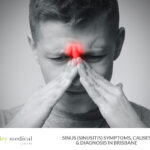When you hear the word “migraine,” you probably think of intense head pain. But it is far more complex. It is a neurological condition that can cause chronic fatigue, brain fog, mood changes and sensory sensitivity, even when there’s no head pain.
What You will Learn in This Article
- What causes migraines and their stages
- How migraines affect more than just your head
- Why you may feel tired, foggy or anxious.
- How our GPs help with chronic migraine management
- Lifestyle tips and holistic care options to ease symptoms
What Is a Migraine?
A migraine is a type of headache disorder that affects roughly one in seven people globally. Unlike typical headaches, migraines often involve intense throbbing, nausea and sensitivity to light and sound.
But there’s more to it. It involves changes in brain function, especially in areas linked to mood, sleep and energy. It is a sensory processing disorder which means your brain may overreact to stimuli like noise, stress, or even certain foods.
Symptoms Go Beyond Pain
Many patients experience non-painful symptoms such as:
- Mood swings or low mood
- Fatigue or tiredness
- Difficulty concentrating (brain fog)
- Light or sound sensitivity
- Digestive changes or nausea
These symptoms may appear before the headache (premonitory phase), during the migraine, or after the pain resolves (post drome phase). For some, they can persist for days reducing productivity, focus and wellbeing.
The 4 Stages of a Migraine Episode
Understanding the stages of a migraine can help you track your symptoms and seek early support from your GP.
1. Premonitory Phase
Begins hours or days before pain. You may feel low in mood, yawn more than usual, feel thirsty or crave certain foods.
2. Aura (in some people)
Visual or sensory disturbances such as flashing lights, blind spots, or tingling sensations.
3. Headache Phase
Typically a throbbing pain on one side of the head, worsened by activity, with accompanying nausea or light sensitivity.
4. Post drome Phase (Hangover)
Tiredness, mental fog and low energy may persist for up to 48 hours after the headache ends.
Why Migraine Often Includes Fatigue and Mood Changes
Studies show that it affects limbic areas of the brain, which also regulate emotion, energy and cognitive function. That explains why so many people feel drained, moody, or mentally foggy even without a headache.
This makes migraine management not just about treating pain but also addressing fatigue, stress, poor sleep and other symptoms.
Migraine and Mental Health: A Two-Way Link
Research confirms a strong link between migraine, anxiety and depression. In fact:
- People with migraines are twice as likely to have depression
- The frequency of attacks is linked with higher stress and anxiety levels
- Mood changes can occur even before the pain starts
This connection is not all in your head it is biological. Shared brain pathways and neurotransmitters influence both migraine and mood disorders.
Seeking help from your GP or a psychologist can improve both your migraine and mental wellbeing.
How Your GP Can Help Manage Migraine Holistically
At Berkeley Medical Centre, our GPs take a whole-person approach to migraine care. Instead of focusing only on pain, we look at how it affects your overall health.
Your GP Can Help You With:
- Accurate diagnosis using your symptom history
- Personalised management plans
- Medications to relieve or prevent migraines
- Support for mood, sleep and fatigue symptoms
- Referrals to allied health services like psychologists or physiotherapists
Practical Tips to Prevent Triggers
In addition to treatment, simple lifestyle changes can reduce the frequency and severity of your migraines.
- Keep a migraine diary to track triggers
- Eat regular, balanced meals avoid skipping breakfast
- Sleep consistently (same hours every night)
- Stay hydrated dehydration can trigger migraine
- Manage stress through exercise, meditation or talking to a psychologist
- Avoid excessive caffeine or alcohol
When to See a GP for Migraine
It is time to see your GP if:
- You have frequent or worsening headaches
- Migraine is affecting your work, study or family life
- Over-the-counter pain relief is not working
- You experience mood changes, brain fog or fatigue between episodes
- You feel overwhelmed managing it on your own
You do not have to wait until it gets worse. Your GP can help you manage migraine early and effectively.
Final Thoughts: Migraine Is a Full-Body Condition Not Just Head Pain
Migraine affects far more than your head. It touches your mood, energy, thinking and quality of life. That’s why it is so important to treat it as a whole-body condition, not just a pain issue. At Berkeley Medical Centre in Brisbane, we help patients manage migraines with personalised GP support, holistic care and access to mental health and allied health services.







